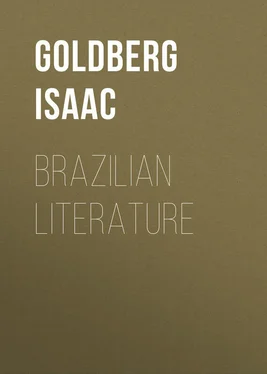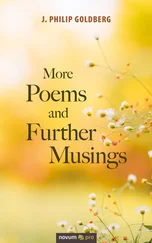Isaac Goldberg - Brazilian Literature
Здесь есть возможность читать онлайн «Isaac Goldberg - Brazilian Literature» — ознакомительный отрывок электронной книги совершенно бесплатно, а после прочтения отрывка купить полную версию. В некоторых случаях можно слушать аудио, скачать через торрент в формате fb2 и присутствует краткое содержание. Жанр: foreign_antique, foreign_prose, на английском языке. Описание произведения, (предисловие) а так же отзывы посетителей доступны на портале библиотеки ЛибКат.
- Название:Brazilian Literature
- Автор:
- Жанр:
- Год:неизвестен
- ISBN:нет данных
- Рейтинг книги:4 / 5. Голосов: 1
-
Избранное:Добавить в избранное
- Отзывы:
-
Ваша оценка:
- 80
- 1
- 2
- 3
- 4
- 5
Brazilian Literature: краткое содержание, описание и аннотация
Предлагаем к чтению аннотацию, описание, краткое содержание или предисловие (зависит от того, что написал сам автор книги «Brazilian Literature»). Если вы не нашли необходимую информацию о книге — напишите в комментариях, мы постараемся отыскать её.
Brazilian Literature — читать онлайн ознакомительный отрывок
Ниже представлен текст книги, разбитый по страницам. Система сохранения места последней прочитанной страницы, позволяет с удобством читать онлайн бесплатно книгу «Brazilian Literature», без необходимости каждый раз заново искать на чём Вы остановились. Поставьте закладку, и сможете в любой момент перейти на страницу, на которой закончили чтение.
Интервал:
Закладка:
José de Anchieta (1530-1597) is now generally regarded as the earliest of the Brazilian writers. He is, to Romero, the pivot of his century’s letters. For more than fifty years he was the instructor of the population; for his beloved natives he wrote grammars, lexicons, plays, hymns; a gifted polyglot, he employed Portuguese, Spanish, Latin, Tupy; he penned the first autos and mysteries produced in Brazil. His influence, on the whole, however, was more practical than literary; he was not, in the esthetic sense a writer, but rather an admirable Jesuit who performed, amidst the greatest difficulties, a work of elementary civilization. The homage paid to his name during the commemoration of the tercentenary of his death was not only a personal tribute but in part, too, a rectification of the national attitude toward the Jesuit company which he distinguished. It was the Jesuits who early established schools in the nation (in 1543 they opened at Bahia the first institution of “higher education”); it was they who sought to protect the Indians from the cruelty of the over-eager exploiters; Senhor Oliveira Lima has even suggested that it was owing to a grateful recollection of the services rendered to the country by the Jesuits that the separation between Church and State, decreed by the Republic in 1890, was effected in so dignified and peaceful a manner. Lima quotes Ribeiro to the effect that the province of Brazil already possessed three colegios in Anchieta’s time, and that the Jesuits, by the second half of the sixteenth century had already brought at least 100,000 natives under their guidance. 33 33 Oliveira Lima. Formación Historica de la Nacionalidad Brasileña. Madrid, 1918. This Spanish version, by Carlos Pereyra, is much easier to procure than the original. Pp. 35-38.
Romero, “scientifist” critic that he was, considered the Jesuit influence “not at all a happy one in the intellectual and esthetic formation of the new nationality.” Of one thing we may be quite certain, in any event: Anchieta’s position as precursor is more secure than his merits as a creative spirit. His chief works are Brasilica Societatis Historia et vita clarorum Patrum qui in Brasilia vixerunt , a Latin series of biographies of his fellow-workers; Arte da grammatica da lingoa mais usada na costa do Brasil , a philological study; his Cartas (letters); and a number of autos and poems.
Next to Anchieta, Bento Teixeira Pinto, who flourished in the second half of the sixteenth century, is Brazil’s most ancient poet. 34 34 See, however, on the matter of priority, José Verissimo’s Estudos de Literatura Brazileira, Quarta Serie . Pp. 25-64.
Much ink has been spilled over the question as to whether he was the author of the entertaining Dialogo das Grandezas do Brazil and the scrupulous Varnhagen, who at first denied Bento Teixeira’s authorship of that document, later reversed his position. Similar doubt exists as to the real author of the Relação do Naufragio que passou Jorge de Albuquerque Coelho, vindo do Brasil no anno de 1565 , a moving prose account of a shipwreck in which figures the noble personage of the title, but wherein the supposed author nowhere appears.
To that same noble personage, governor of Pernambuco, is dedicated the Prosopopéa , undoubtedly the work of Bento Teixeira, and just as undoubtedly a pedestrian performance in stilted hendecasyllabic verses, ninety-four octaves in all, in due classic form. There is much imitation of Camões, who, indeed, entered Brazilian literature as a powerful influence through these prosaic lines of Bento Teixeira. “His poem (i. e., the Lusiads of Camões ) is henceforth to make our epics, his poetic language will provide the instrument of our poets and his admirable lyrism will influence down to the very present, our own in all that it has and preserves of sorrow, longing, nostalgia and Camonean love melancholy.” 35 35 Ibid. P. 54. Also pp. 63-64. “To be the first, the most ancient, the oldest in any pursuit, is a merit… This is the only merit that Bento Teixeira can boast.”
In the Prosopopéa occurs a description of the recife of Pernambuco which has been looked upon as one of the first evidences of the Brazilian fondness for the native scene. The passage is utterly uninspired; Neptune and Argos rub shoulders with the barbaros amid an insipid succession of verses. Verissimo sees, in the entire poem, no “shadow of the influence of the new milieu in which it was conceived and executed.” The earliest genuine manifestation of such nativism in poetry he does not discover until A Ilha da Maré , by Manoel Botelho de Oliveira, which, though published in the eighteenth century was, most likely, written in the seventeenth. 36 36 Verissimo, always a suggestive commentator, presents an interesting reason for these early national panegyrics. See the essay cited in the preceding notes, pages 50-51. He attributes the swelling chorus of eulogies to what might today be called a national “inferiority complex.” “Having no legitimate cause for glory, – great deeds accomplished or great men produced, – we pride ourselves ingenuously upon our primitive Nature, or upon the opulence, – which we exaggerate – of our soil.”
The chroniclers of the early colonial period present chiefly points of historic, rather than literary, interest. Pero de Magalhães Gandavo, with his Historia da Provincia de Santa Cruz a que vulgarmente chamamos Brasil (with a verse-letter by Luiz de Camões as preface), published in 1576 in Lisbon, is regarded as the first in the long line of historians; even today he is valuable as a source. Gabriel Soares de Souza, is far better known for his Tractado descriptivo do Brasil em 1587 , printed in 1851 by Varnhagen and highly praised by that voluminous investigator for its “profound observation.” … “Neither Dioscorides nor Pliny better explains the plants of the old world than Soares those of the new… It is astonishing how the attention of a single person could occupy itself with so many things … such as are contained in his work, which treats at the same time, in relation to Brazil, of geography, history, typography, hydrography, intertropical agriculture, Brazilian horticulture, native materia medica, wood for building and for cabinet-work, zoology in all its branches, administrative economy and even mineralogy!”
Of less importance is the Jesuit Father Fernão Cardim (1540-1625), whose work was made known in 1847 by Varnhagen under the geographic title Narrativa epistolar de uma viagem e missão jesuitica pela Bahia, Ilheos, Porto Seguro, Pernambuco, Espirito Santo, Rio de Janeiro, etc. It consists of two letters, dated 1583 and addressed to the provincial of the Company in Portugal. Father Cardim was translated into English as early as 1625, being thus represented by the manuscript called Do Principo e origem dos indios do Brasil e de seus costumes, adoração e ceremonias , if this is, as Capistrano de Abreu has tried to prove, really the work taken in 1601 by Francis Cook from a Jesuit bound for Brazil. For, “it was exactly in this year … that Father Fernão Cardim, who was returning to Brazil from a voyage to Rome, was taken prisoner by English corsairs and brought to England.”
There is little profit in listing the men and works of this age and character. According to Romero the chroniclers exhibit thus early the duplex tendency of Brazilian literature, – description of nature and description of the savage. The tendency grows during the seventeenth century and in the eighteenth becomes predominant, so that viewed in this light, Brazilian nativism, far from being the creation of nineteenth century Romanticism, was rather a historic prolongation.
Читать дальшеИнтервал:
Закладка:
Похожие книги на «Brazilian Literature»
Представляем Вашему вниманию похожие книги на «Brazilian Literature» списком для выбора. Мы отобрали схожую по названию и смыслу литературу в надежде предоставить читателям больше вариантов отыскать новые, интересные, ещё непрочитанные произведения.
Обсуждение, отзывы о книге «Brazilian Literature» и просто собственные мнения читателей. Оставьте ваши комментарии, напишите, что Вы думаете о произведении, его смысле или главных героях. Укажите что конкретно понравилось, а что нет, и почему Вы так считаете.












